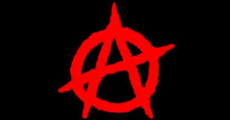
Email: ZYVC057@live.rhul.ac.uk
Total Article : 213
About Me:I'm a graduate student studying International Criminal Law and first started writing for King's News almost 4 years ago! My hobbies include reading, travelling and charity work. I cover many categories but my favourite articles to write are about mysteries of the ancient world, interesting places to visit, the Italian language and animals!

The concept of anarchy is one of great ambiguity and is defined best in its most elementary form as the absence of leaders and orderly structure. The word anarchy derives from the ancient Greek ἀναρχία (anarchia), which is made of ἀν (an), meaning "without" and ἀρχός (arkhos), meaning "ruler." The term in fact initially referred to societies or groups which do not recognise authority; it originally signified lawlessness and leaderlessness. However, in 1840, Pierre-Joseph Proudhon used the word anarchy in his treatise “what is property?” referring it to a new branch of political philosophy, known as anarchism, which described stateless societies.
The aftermath of the Cold War fed the evermore expanding global interdependence of countries paving way to two conflicting theories in regards to international anarchy and governance. According to one observation anarchy is being over-ridden by an underpinning hierarchical system, where hegemony may be defined as ‘the ability of the most powerful to states to determine the nature of the society, and especially its practise’ (Watson 1997). This calls for a structural realist approach to international affairs as it assumes that all states move within the shadow of anarchy, the binding ground of politics. The function of international organisations is undermined as ineffective and unattainable therefore in the absence of a global authority states will always act in self-interest and international anarchy determines state actions fostering an inevitable conflict for power amongst them.
The second view put forward after the Cold War does not rely on state hegemony as a means to limit anarchy but considers the world as becoming ever more anarchical by both single actors such as the USA and collective actors like the United Nations. This observation was enforced by the dismantlement of the bipolar system of hegemonic governance on behalf of the US and the Soviet Union which until then maintained global order. Rosenau considers both views which lead him to assume that the world has reached a phase of ‘post-internationalism’ in which ‘world politics unfold without the direct involvement of states’. There are countless types of anarchism, each of which differ greatly from the last. Anarchist schools of thought can range from supporting absolute collectivism to complete individualism!
Pierre-Joseph Proudhon
Pierre-Joseph Proudhon was a French politician born in 1809. He was also the first person to call himself an anarchist and is therefore considered to be a key theorist in the field, some consider him so highly to call him the father of anarchism. His most popular work “What is Property? Or, an Inquiry into the Principle of Right and Government” (“Qu'est-ce que la propriété? Recherche sur le principe du droit et du gouvernement”) attracted the attention of Karl Marx, who then commenced a correspondence with Proudhon. The two met in Paris during Marx’s time in exile there and influenced each other’s’ ideas to some extent. Their friendship came to an end due to a dispute over one of Proudhon’s provocative works, “The System of Economic Contradictions, or The Philosophy of Poverty”.
In “The Confessions of a Revolutionary” Pierre-Joseph Proudhon boldly stated that “Anarchy is order without power”. This iconic phrase is said to have been inspirational to the anarchist circled-A symbol which today is one of the more popular graffiti seen.
Image: https://ldsanarchy.files.wordpress.com/2007/10/cropped-anarchy.jpg

0 Comment:
Be the first one to comment on this article.